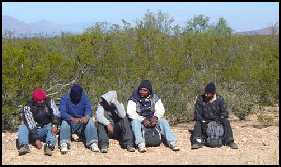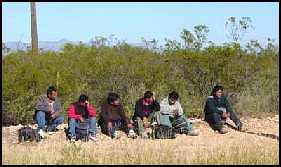|
|
||||||||||
 |
|
CHD ASSISTING BORDER PATROL WITH RECORD NUMBER OF APPREHENSIONS DURING WHAT IS TYPICALLY A SLOW TIME FOR ILLEGAL CROSSINGS |
|
|
||||||||||||
|
AFFIRMATIVE ACTION GOES ONE STEP FURTHER: NOW CRIMINALS GET A BREAK ON THE AMERICAN DREAM “LOCAL HISPANICS FIND RULES LOOSENED FOR DOCUMENTATION” |
|
By Daniel Connolly Birmingham Post-Herald It’s becoming easier for Hispanic immigrants, including those here illegally, to buy houses, purchase car insurance and open bank accounts. The phenomenon was on display Saturday at Fiesta 2004 where thousands of people, mostly Hispanic, gathered in Linn Park to enjoy live music, dancing, food and activities for children. Attendance was higher than last year and more businesses were present to market products to the Hispanic population. Three companies at the fair--a mortgage company, a bank and an insurance agency-- don’t require customers to have Social Security numbers to use their services. Illegal immigrants and some legal immigrants don’t have Social Security numbers, which many companies require. Some area residents have expressed concern about companies that offer services to undocumented people, saying they help normalize those whose presence in the United States is illegal. Representatives of the companies said they’re providing valuable services to people who need them. The fair attracted somewhere between 10,000 and 11,000 people, compared with 7,000 last year, said Mike Suco president of Fiesta Inc., the festival’s organizer. Bilingual representatives of Team Mortgage had a tent at the fair and were talking to those interested in buying houses. The Birmingham-based firm started its loan program geared to Hispanics about three months ago, owner Norma Jean Prestley said. It currently has four Spanish-speaking mortgage originators. “I think it’s an untapped market, and we’re just trying to position ourselves so we can help the Hispanic population,” she said. The company has given about 30 loans to Hispanics in the last three years, Prestley said. “I’d love to do 300 next year. There’s no reason not to,” she said. Most of those who come to the company present Social Security numbers, she said. But so far the company has arranged home loans for three people who didn’t have them, she said. Prestley said the three weren’t here illegally they simply didn’t have a Social Security number yet and had been rejected by other lenders. But she said the company would help illegal immigrants who want to buy homes. First, she would put the client in touch with Patriot Tax International, a company that helps immigrants complete income tax forms and acquire a tax identification number. Illegal immigrants and others can legally use the number to pay income taxes. Then she would put the client in touch with a private investor, who she wouldn’t name. The investor requires a 10 percent downpayment and charges a 9.9 percent interest rate, which is higher than the rate most lenders charge. Team Mortgage tries to help these borrowers obtain their mortgages at a lower rate after one year if they can document their immigration status and build a credit history, she said. One area resident said the company’s action and the positions of politicians in the United States and Mexico make a mockery of immigration law. “I feel like it’s just sort of a concerted effort to undermine the rule of law concerning immigration,” said Anthony Leach, 40, a Huffman resident. Leach, a security guard, has written to elected officials and news organizations to express his opposition to illegal immigration. “And it also seems to be unbalancing the playing field because I understand it’s harder for African-Americans to get loans,” said Leach, who is black. Prestley said she doesn’t believe she is doing anything wrong. “I’m just trying to help people out and I don’t see them as illegal. If they’re undocumented we try to steer them in the right direction,” she said, saying her company encourages people to pay taxes, build credit histories and open bank accounts. She refers clients to the Banco Hispano, a branch of the Bank of Alabama that also had a booth at the fair. The bank has bilingual tellers and doesn’t require a Social Security number to open an account. It accepts two forms of government-issued identification, including from foreign governments. Not far away from the bank’s display, people were registering to win a DVD player and a child’s car seat at the booth for Infinity Insurance, a Birmingham-based car insurance company. “The majority of our business is written in California,” said Stephen Kilpatrick, business development manager. “We have great success there due in part to the Hispanic community.” There’s a wrinkle. Many Hispanic immigrants can’t get an Alabama driver’s license because of their immigration status. Infinity is willing to write insurance policies even if they don’t have an Alabama license, though clients have to pay extra. “Our goal is to become the number one writer of automobile insurance for the Hispanic market. We know in order to do that we have to take international or foreign drivers’ licenses,” Kilpatrick said. |
|
GOOD NEIGHBORS TO THE SOUTH SERVE UP HALLOWEEN TRICKS ON BORDER PATROL GROUP OF THUGS VIOLENTLY ATTACK BORDER PATROL AGENTS IN NOGALES |
|
An organized crime ring of human-smugglers pulled off a dangerous Halloween trick on Border Patrol over the past weekend. Mixed in with about 350 Halloween costumed trick-or-treaters at the Nogales border port of entry Sunday afternoon, human-smugglers started a riot that shut down the port of entry for about an hour. Mexican citizens were told over radio broadcasts that they could cross the border into Nogales, Arizona, for free Halloween candy. The city has allowed the candy giveaway for three years. Many of the people who showed up for the candy feast did not have visas to enter the United States. At the same time, human-smugglers, using the costumed trick-or-treaters as decoys, mixed illegal aliens in with the crowd. They then began to push across about 400 people, through holes they had cut in the border wall east of the port of entry. Sunday afternoon Border Patrol agents noticed people cutting holes in the fence and pulled in to try and stop those running through them. A welding crew moved in to seal the holes as other agents stood guard. As the agents worked to seal the holes people from the Mexican side started throwing objects at the agents. Among the items thrown at Border Patrol agents were tires, eggs, wooden pallets and according to information officer Andy Adame, 40- to 50-pound rocks were hurled through the air with some kind of projection device. “An agent on a bicycle was hit so hard his bike helmet cracked in two,” Adame said. A mob of parents and children then converged on the port of entry and officials decided to close the crossing point when people became unruly when they were not allowed entry into the United States to participate in traditional Halloween activities. Border Patrol reports that crossings and apprehensions of illegal aliens are up 20% for the first month of the new fiscal year that began October 1, 2004. Border Patrol agents have captured 31,727 people in the Tucson sector; 15,838 were caught in Cochise County. Of the total almost 2,500 had criminal records or warrants for their arrest either in the United States or Mexico. According to figures released by Border Patrol the breakdown on types of crimes is as follows: Homicide –9 Drugs –244 Sex offenses – 38 Robbery, burglary or larceny – 189 Immigration offenses – 1,293 608 other people were found to be wanted for crimes including kidnapping, extortion, fraud, arson and various weapons charges. |
|
RUSSIANS JOIN CHD IN TRACKING DOWN 11 POTENTIAL TERRORISTS IF THEY DIDN’T KNOW HOW SOFT OUR BORDERS ARE BEFORE, THEY DO NOW |
|
|
||||||||||||
|
THE ILLEGAL-ALIEN CRIME WAVE |
|
The following article is lengthy and we will continue it in next week’s issue of the Tumbleweed. We think you will find it shocking to say the least. Senators Kyl, McCain and Congressman Kolbe do not want you to know the brutal truth. We do. By: Heather Mac Donald Some of the most violent criminals at large today are illegal aliens. Yet in cities where the crime these aliens commit is highest, the police cannot use the most obvious tool to apprehend them: their immigration status. In Los Angeles, for example, dozens of members of a ruthless Salvadoran prison gang have sneaked back into town after having been deported for such crimes as murder, assault with a deadly weapon, and drug trafficking. Police officers know who they are and know that their mere presence in the country is a felony. Yet should a cop arrest an illegal gangbanger for felonious reentry, it is he who will be treated as a criminal, for violating the LAPD’s rule against enforcing immigration law. The LAPD’s ban on immigration enforcement mirrors bans in immigrant-saturated cities around the country, from New York and Chicago to San Diego, Austin, and Houston. These “sanctuary policies” generally prohibit city employees, including the cops, from reporting immigration violations to federal authorities. Such laws testify to the sheer political power of immigrant lobbies, a power so irresistible that police officials shrink from even mentioning the illegal-alien crime wave. “We can’t even talk about it,” says a frustrated LAPD captain. “People are afraid of a backlash from Hispanics.” Another LAPD commander in a predominantly Hispanic, gang-infested district sighs: “I would get a firestorm of criticism if I talked about [enforcing the immigration law against illegals].” Neither captain would speak for attribution. But however pernicious in themselves, sanctuary rules are a symptom of a much broader disease: the nation’s near-total loss of control over immigration policy. Fifty years ago, immigration policy might have driven immigration numbers, but today the numbers drive policy. The nonstop increase of immigration is reshaping the language and the law to dissolve any distinction between legal and illegal aliens and, ultimately, the very idea of national borders. It is a measure of how topsy-turvy the immigration environment has become that to ask police officials about the illegal-alien crime problem feels like a gross faux pas, not done in polite company. And a police official asked to violate this powerful taboo will give a strangled response—or, as in the case of a New York deputy commissioner, break off communication altogether. Meanwhile, millions of illegal aliens work, shop, travel, and commit crimes in plain view, utterly secure in their de facto immunity from the immigration law. I asked the Miami Police Department’s spokesman, Detective Delrish Moss, about his employer’s policy on lawbreaking illegals. In September, the force arrested a Honduran visa violator for seven vicious rapes. The previous year, Miami cops had had the suspect in custody for lewd and lascivious molestation, without checking his immigration status. |
|
ON THE BACKS OF THE POOR |
|
Forbes Magazine - November 11, 2004 by Seth Lubove Illegal immigrants don’t dare open a bank account in the U.S. To wire money overseas, they pay a hefty fee. One company has built a billion- dollar business on their dilemma. Shielded by bulletproof glass, the crowded check-cashing outlet on Anaheim Street in Wilmington, a Hispanic neighborhood in southern Los Angeles, functions as lifeline and financial center for the thousands of illegal immigrants who visit it. Open seven days a week, it caters to the unbanked--people who are too poor, or too illegal, to have a bank account. It offers them “free money orders,” welfare-benefit pickups, prepaid phone cards and the real clincher: money transfers to relatives overseas. They pay hefty fees--almost a day’s wages in some cases--for a transaction that costs $3 to $6 to process. A few blocks away a young woman named Teresa stands in her tiny, dirt- packed front yard and passes judgment on the store’s fees: “Way too much,” she says in Spanish, as some of her seven children scamper barefoot among strewn toys and a battered van propped up on jacks. Teresa, who doesn’t want her last name used, is poor and illegal, having slipped into Arizona from Mexico a year ago. When she first arrived, her 17-year-old son wired a $1,000 payoff, or two months’ pay, to the “coyote” who brought her in. The transfer fees cut the smuggler’s take to only $900, and he abandoned her in anger, she says. When her sister, Aurora, sent $90 back to family in Mexico a few months ago, it cost her $14; when she sent $50 a month later, it cost her $15--this for a woman who doesn’t work and depends on her husband’s sporadic income. Teresa is one face behind the booming, multibillion-dollar transfer business that has revived the fortunes of a 153-year-old corporate icon: Western Union. The company that pioneered coast-to-coast telegraph service in 1861 dominates the money-transfer business today, racking up $3 billion in fees and investment income, and an operating profit (net before interest, taxes and nonrecurring charges) of $1 billion last year--most of it on the backs of the poor. In five years it has extended its vast tentacles into thousands of check-cashing joints, pawnshops and other gritty outposts of the fringe economy to better exploit the dreary unbankability of the underclass. Western Union handled 81 million cash transfers last year, with a face value that appears to be close to $30 billion. But all that cash, handed over in crumpled wads by calloused hands, has made Western Union a tempting target for regulators, politicians and advocates for the indigent. Western Union is under fire as never before (which may be one reason the company declined any interviews for this story). The feds are investigating it for locking in agents exclusively and forbidding them to offer cheaper rival services. The U.S. Department of the Treasury’s Financial Crimes Enforcement Network is questioning whether the company may be unwittingly setting up agents who turn out to have terrorist ties, though no hard evidence has been cited. Western Union has already agreed to pay $45 million in vouchers to settle a class action that accused it of deceptive practices in currency exchange. Congress is mulling proposals that would increase federal oversight of the lightly regulated transfer business, requiring full disclosure of fees. Anti-immigration forces, meanwhile, accuse Western Union of aiding and abetting a flood of illegal aliens to U.S. shores. Western Union and others “lure people up here, put them in very precarious situations and are responsible for their deaths,” says Michael McGarry of the Colorado Alliance for Immigration Reform, a hard-line group that has thrown up billboards bearing a map of the U.S. stamped with the word “FULL.” Western Union’s money transfer business seems shrewdly geared to the 8.7 million illegal immigrants in the U.S. If they walk into a regular bank to wire money overseas, the fees will be lower, but the senders are asked for identification and personal details they don’t want to provide. At a Western Union shop such formalities are shelved and anonymity is prized; for transfers of less than $1,000, no ID is required at all. The tradeoff is far higher fees: Western Union charges $16 in fees and foreign currency exchange costs to send $300 to Mexico, 50% higher than the rates of four rivals, a study by UBS Securities finds. The coming crackdown could crimp the company’s hell-bent expansion. Western Union fuels handsome growth at First Data Corp., the Denver firm that acquired it in buying First Financial Management Corp. in 1995 for $6.7 billion. First Data, in the nine months ended September 30, posted a 41% jump in net income from continuing operations to $1.4 billion and a 19% increase in revenues to $7.3 billion. First Data shares are trading at $40 or so, up 14% in 11 months and near their recent all-time high of $47. That makes the company worth $34 billion. The Western Union deal was engineered by First Data veteran Charles Fote, 55, who rose to chief executive two years ago. He is a driven man who is said to roust his lieutenants most mornings for conference calls that begin at 6:30 a.m. Under his gaze Western Union’s reach has grown from 55,000 to 200,000 storefronts since 1998; in the U.S. it grew from 30,000 to 65,000. That expansion has helped spark a kind of underground foreign aid: Some $200 billion in cash transfers now course around the globe from one country to another, exceeding foreign investment and aid in many countries. The $14 billion that went to Mexico last year, a 33% jump over the prior year, is now the second-largest source of income for that country, behind oil exports. Remittances make up 33% of the gross domestic product of Haiti and 29% of the GDP of Nicaragua. Senator Paul Sarbanes, the Maryland Democrat and sponsor of a crackdown bill, says money zappers such as Western Union, which controls as much as 90% of the business in some markets, siphon off up to $4 billion of the $30 billion sent from the U.S. to Latin America. First Data has tried to counter the criticism by forming a $10 million “Empowerment Fund” for immigrants and staging immigration “reform” panels around the country. But the sessions have emboldened the company’s critics and sparked a melee or two. At the panel in July in Denver, a woman was arrested after pummeling an anti- immigration heckler, Terry Graham. Graham filed a lawsuit against the woman, First Data and Western Union alleging negligence and misconduct. The parent company has even managed to get into a spat with its own representative, outspoken conservative Colorado Republican Congressman Tom Tancredo. He sparked the fight last May by briefly suggesting that cash transfers to foreign recipients should be taxed. “This guy is off in left field, and we’re tired of his antics, tired of his games,” a First Data spokesman huffed in the Rocky Mountain News at the time. Now Tancredo accuses the company of retaliating against him by forming a new political action committee to help Tancredo’s Democratic opponent defeat him in November. “If they want to use me as a whipping boy for some marketing thing, they have a right to do it,” says Tancredo, but “there is a line they may have crossed.” Responding with vague written answers to specific questions about Western Union’s tactics, First Data says it “does not support any illegal immigration initiatives. “Whatever that means. It adds that the new company PAC will “ensure that our voice is heard” and is “completely bipartisan.” For now, at least, the criticism has done little to aid Western Union’s competitors. Congress, regulators and diplomats have encouraged banks to get into the game, but they haven’t made much progress; they handle only 3% of the transfers to Mexico, says a study by Georgetown University’s Manuel Orozco for the Pew Hispanic Center. Of the 40 million money transfers from the U.S. to Mexico each year, the four biggest banks in the field--Citibank, Wells Fargo, Harris Bank and Bank of America--handled just 1.2 million. Prices, after falling to half of what they were in the 1990s, have since leveled off. Not far from Teresa’s dirt-caked yard in Wilmington, Lucia Moreno-Linares runs the Family Federal Credit Union. With just a single outpost and $11.7 million in assets, it provides financial workshops for its 4,100 members and requires anyone cashing a check to set aside a portion to build up a savings account. The credit union had offered Western Union money transfers and, ten years ago, switched to Vigo, the nation’s third-largest service. Now Family Federal charges $10 to wire up to $1,000, lower than Western Union’s fees. Despite the rock-bottom price, however, Family Federal handles just 60 to 70 transfers a month, for a total of $500,000 in transfers a year. “When we ask for ID and the name of the person the money is being sent to, customers say we’re hassling them because Western Union doesn’t ask for all that,” says Moreno-Linares. Vigo’s chief executive, Mario Trujillo, blames Western Union’s heavy- handed tactic of tying up its agents. “There are agents in the U.S. who would love to have our service but can’t,” says Trujillo. “Long- term exclusive agreements aren’t healthy for us or for consumers.” Western Union disclosed in February that the Department of Justice, joined by “several” states, is looking into the company’s “contractual relationships” with the agents. The Federal Trade Commission and one unnamed state had previously made similar inquiries but dropped the investigation. The company insists the money transfer business has become “even more dynamic and highly competitive.” In Wilmington myriad money transfer outlets compete for a thriving immigrant trade. At the main intersection of Anaheim and Avalon boulevards a MoneyGram in an ACECash Express check-cashing store competes against a Western Union outpost in a Rite Aid just across the parking lot. Down the street a pristine, nearly empty branch of Mexican banking giant Bancomer, devoted to money transfers, sits a few storefronts down from a cluttered travel agent offering transfers under the Orlandi Valuta brand--a subsidiary of Western Union’s parent. A little farther up Avalon Boulevard, the Guanajuato meat market offers Mexico Express from a specially built glass enclosure, offering transfers of up to $1,000 for $10 (while a bootlegger sells DVDs of new movie releases just outside the store). But many of the immigrants, legal or not, are drawn to Western Union, despite the fees. José, a waiter at the Birria Tepechi Mexican restaurant on Avalon Boulevard, says he uses Western Union to send $1,000 every two months to his parents in Sahuayo, a town in the Mexican state of Michoacan. “It’s a lot easier, and they’re all over the place,” he says. |
|
[Home] [Borderline Politics] [Contact] [Donate] [Photo Gallery] [Minuteman Project Standard Operating Procedure] [Registration] |



